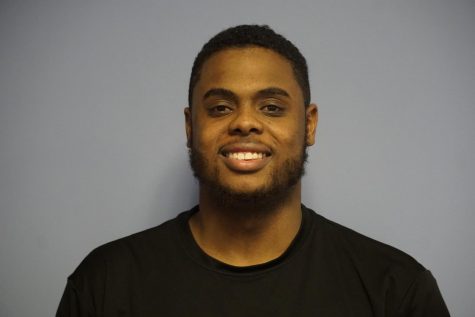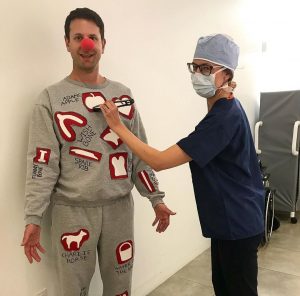Iona dedicates a corner of Mazzella Field to Pat Quinn
September 19, 2018
Prior to the Iona College rugby game against the Naval Academy on Sept. 15, both teams gathered at the right corner of Mazzella Field— where alumnus Pat Quinn sat in his wheelchair—while the school revealed a plaque hanging on the fences to honor his relentless battle againstamyotrophic lateral sclerosis (ALS).
“This field dedication is so special to me,” Quinn said via text message. “Iona has been right behind me in my fight against ALS. This disease is ruthless. It continues to take from me. Every aspect of my life has been rocked by ALS. But to have the consistent support of my alma mater, it’s a great source of inspiration. Iona is a unique place. This isn’t some big university where people get left behind. This is a family. The support is real. I’m very lucky to be a Gael.”
Quinn, who graduated in 2006, was a rugby player during his time at Iona. He saw his life drastically change when ALS took away his ability to walk and talk. Quinn didn’t let his physical abilities keep him from fighting against ALS and to help raise money to find a cure.
Quinn co-founded the ALS Ice Bucket Challenge in 2014. Since then, millions of people around the country have taken on the challenge and dumped ice-cold buckets of water on their heads to create awareness for the disease.
“The name Pat Quinn is synonymous to this college,” Iona College President Dr. Joseph E. Nyre said. “When Pat was diagnosed, he went into action. He took action to figure out how he can fight against the disease. Not just for himself, but for everyone. He rallied the nation and the world behind the Ice Bucket Challenge. That’s the power one person can do.”
When the idea of dedicating a part of Mazzella Field to Quinn came up, Board of Trustees member JoAnn Mazzella Murphy got on board right away and helped push to get it done.
“We want to thank JoAnn Mazzella Murphy. She’s a board member and the field is named in her parents’ honor,” Nyre said. “It was Mrs. Murphy, who got on board right away and said ‘of course we should honor Pat Quinn.’ We are proud of what he has done and how he continues to live his life.”
“[Quinn] rallied the nation and the world behind the ice bucket challenge. That’s the power one person can do.”
-Iona President Dr. Joseph Nyre
Quinn, a Yonkers native, hasn’t let the disease take away his love of rugby. He shows constant support towards the players and coaches. Quinn treats the team as a brotherhood and wants to them to know he has their backs no matter what.
“I have been lucky enough to get to know many of the boys,” Quinn said. “I text and Facebook message as many of the players as I can. I want to be someone who is there for them no matter what is going on, both on and off the field. This group is special. I’m honored to consider many of them my friends. The support they show me literally keeps my fight strong.”
Quinn’s support and willingness to contact members of the team gives players inspiration they need before a game.
“One thing about Pat, he will always reach out and do it at the perfect time,” senior center Michael Scarcella said. “He messaged me a day before the game and it was nothing but inspiration. “Anyone can learn from him. He has so much to offer even though he is limited.”
Head coach of Iona rugby Bruce McLane is inspired by Quinn’s determination to fight for what he believes in and to never give up.
“Pat Quinn has meant so much to our [college],” McLane said. “He stands for everything the [college] stands for. When they said he couldn’t talk, he found a way to talk. When they said he couldn’t get around and couldn’t raise money, he found a way to do that. He’s the man.”
McLane believes it’s important that freshmen or any newcomers to the school know about Quinn’s story, as it can teach them that anyone can make a difference in the world.
“I think Pat’s story speaks to who they are as freshmen,” McLane said. “They don’t know their place in the world, but eventually you’re going to find out what it is and make a difference, whether it’s [for] the life of one person or thousands.”
You can read more about Pat Quinn’s story here.



